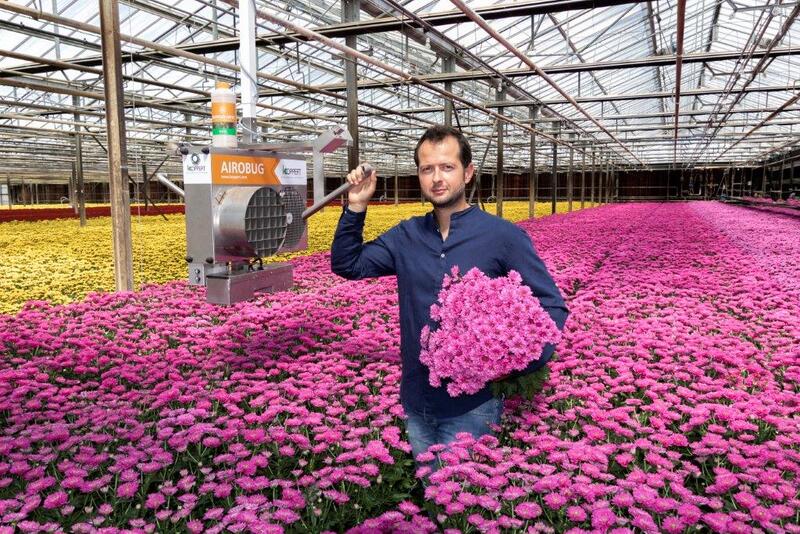
Switching to biological crop protection was not easy for Cavalieri and Papaianni SRL, but their efforts are paying off: they now grow products that are very competitive on international markets. ‘Biological crop protection is the future; we are committed to this method.’
Germany, the Netherlands, and Italy
Cavalieri and Papaianni SRL is located near the town of Bisignano, in Calabria, the ‘boot’ of Italy. The company's largest crop is cut chrysanthemum (28 hectares), as well as potted roses (1 hectare) and potted kalanchoe (also 1 hectare). All crops are grown in greenhouses, fifteen hectares of which are equipped with grow lamps. The heating system runs on methane gas; the electricity and CO2 generated are used in the greenhouses.
The company is owned by Antonio and Simona Papaianni, who are both CEOs. Antonio is in charge of production, while Simona is responsible for administration. Cavalieri and Papaianni SRL has around 100 employees a year and mainly supplies products to Germany, the Netherlands, and Italy.
-----------------------------------------------------------------------------------------------------------------------
Ten years ago, Papaianni took the first steps along the path of biological crop protection. The main reason for embarking on this journey was the moderate effect chemicals had against spider mite. The company also started having trouble with thrips. Papaianni realized that Koppert's predatory mites provided a solution for combating both pests.
‘The first results were decent,’ says Antonio Papaianni. ‘Just a few weeks later, we had gained enough knowledge to be able to properly plan how we would introduce predatory mites and continue with Integrated Pest Management. Two years later, we started using IPM in potted roses.’
Penetrating new markets
The production manager and co-owner of Cavalieri and Papaianni SRL claims that implementing biological crop protection is not a walk in the park. ‘Monitoring the crop and infestation levels, releasing beneficials, and discussing matters with the consultants requires time and therefore money. But now we are reaping the benefits of biological crop protection and can start to penetrate new markets.’
Today, the company uses four beneficials against red spider mites, thrips, and leaf miners. These are the predatory mites Spidex (Phytoseiulus persimilis) and Swirski-Mite (Amblyseius swirskii), the parasitic wasp Miglyphus (Diglyphus isaea), and the nematode product Entonem (Steinernema feltiae).
The company, which grows its own cuttings for chrysanthemums, plans to use NatuGro and Trianum in 2019. Trianum has already been tested and has produced satisfactory results.
A more robust crop
Antonio explains how the effects of biological crop protection are visible soon after the start of a new crop: the young plants are not stressed like they used to be after being sprayed with chemical substances. ‘The colour of the leaves has improved, the stems are of higher quality and stronger, and the crop is more robust than in the past. The flowers have more vibrant colours, which is very important for our sales market and I can proudly tell that the quality is comparable with the Western European production.'
Biological plant protection on the farm costs a fraction more than the chemical approach. ‘But it means we are competitive on the Western European market, which is the greatest benefit for us. At the moment we use IPM on 15 hectares, but we expect to do that on all 28 hectares by April 2019.’
Close collaboration
Over the past ten years, the company has built up a good collaborative relationship with Koppert and there is contact with Koppert's Italy-based consultant dr Felice Pallino almost every day. Antonio Papaianni says this is a conscious decision, because everything has to be perfect. Thanks to this comprehensive guidance, Cavalieri and Papaianni SRL is able to grow products of excellent quality. ‘The results we achieve with biological crop protection, the quality of our products, and our customers’ satisfaction show us that this is the right approach.’
Stiff competition in saturated markets
Consumers in the company's domestic market, Italy, show little interest in biological crop protection. The situation is different elsewhere. ‘We're seeing year-on-year growth in our exports to Western Europe. These markets are saturated, so there's stiff competition. We hope that, one day, the market will also want to pay a little more for products that have been grown without the use of chemicals. We believe in this cultivation method and will continue using it,’ says Antonio.